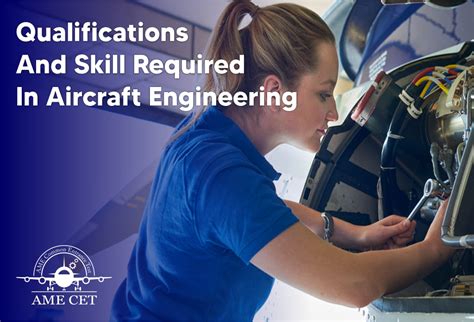Aircraft maintenance is a critical aspect of aviation safety, ensuring that aircraft are operating at peak performance and meeting stringent regulatory standards. To excel in this demanding field, individuals must possess a comprehensive set of technical and interpersonal skills.

Technical Skills
Mechanical Aptitude and Dexterity
Aircraft mechanics require exceptional mechanical aptitude and dexterity to perform hands-on tasks such as:
- Disassembling and reassembling aircraft components
- Inspecting and replacing parts
- Adjusting and calibrating systems
- Troubleshooting and repairing malfunctions
Knowledge of Aircraft Systems
A thorough understanding of aircraft systems is essential for effective maintenance, including:
- Airframe structure and design
- Flight controls
- Propulsion systems
- Electrical systems
- Avionics and navigation
Precision and Attention to Detail
Aircraft maintenance demands precision and meticulous attention to detail. Mechanics must:
- Adhere to strict maintenance procedures
- Ensure accurate measurements and adjustments
- Inspect components thoroughly for defects or wear
Electrical Troubleshooting Skills
Electrical systems play a crucial role in aircraft operation. Mechanics must possess advanced troubleshooting skills to:
- Diagnose and repair electrical faults
- Read electrical diagrams and schematics
- Use test equipment to identify and resolve issues
Computer Literacy
Aircraft maintenance has become increasingly reliant on computer technology. Mechanics must be proficient in:
- Using aircraft maintenance software
- Interpreting technical manuals and engineering drawings
- Troubleshooting computer-controlled systems
Interpersonal Skills
Communication and Teamwork
Effective communication and teamwork are vital in aircraft maintenance. Mechanics must:
- Communicate clearly and concisely with colleagues, supervisors, and customers
- Collaborate efficacement
- Resolve conflicts and reach consensus
Problem-Solving Skills
Aircraft maintenance involves solving complex technical problems. Mechanics must be able to:
- Think critically and analytically
- Identify root causes of malfunctions
- Develop and implement effective solutions
Customer Service Orientation
Aircraft maintenance professionals often interact with customers and other stakeholders. They must:
- Provide clear and timely updates on maintenance status
- Explain technical issues in a non-technical language
- Build relationships and foster trust
Specialized Certifications
In addition to the core skills, aircraft mechanics may obtain specialized certifications to enhance their expertise in specific areas, such as:
- Airframe and Powerplant (A&P) certification (FAA or EASA)
- Avionics certification
- Nondestructive testing (NDT) certification
- Structural repair certification
Educational Requirements
Most aircraft maintenance professionals hold a high school diploma or equivalent. However, some employers may prefer candidates with an associate degree or higher in aviation maintenance technology.
Career Outlook
According to the Bureau of Labor Statistics (BLS), employment of aircraft mechanics is projected to grow 12% from 2020 to 2030. This growth is driven by the increasing demand for air travel and the need to maintain aging aircraft fleets.
Average Salary
The median annual salary for aircraft mechanics was $64,400 in May 2021, according to the BLS. However, salaries can vary depending on experience, certification, and location.
Motivations for Pursuing Aircraft Maintenance
Individuals who pursue aircraft maintenance are typically motivated by:
- A passion for aviation
- A desire to work with their hands
- A commitment to safety
- The opportunity for career advancement
Strategies for Success in Aircraft Maintenance
To succeed in aircraft maintenance, individuals can follow these strategies:
- Seek hands-on experience through internships or apprenticeships
- Obtain relevant certifications and licenses
- Stay abreast of industry best practices and new technologies
- Develop strong communication and problem-solving skills
- Build a positive reputation for professionalism and reliability
FAQs About Aircraft Maintenance
1. What is the minimum age to become an aircraft mechanic?
In the United States, the minimum age to take the A&P exams is 18.
2. How long does it take to become an aircraft mechanic?
The time it takes to become an aircraft mechanic varies depending on the educational path and experience. Typically, it takes 1-2 years to complete an associate degree or certificate program, and additional time to gain experience and obtain certification.
3. What is the salary range for aircraft mechanics?
The salary range for aircraft mechanics depends on experience, certification, and location. In the United States, the median annual salary is $64,400, with the top 10% earning over $100,000.
4. What are the job prospects for aircraft mechanics?
Employment of aircraft mechanics is projected to grow 12% from 2020 to 2030, driven by increasing demand for air travel and the need to maintain aging aircraft fleets.
5. Can aircraft mechanics work in other industries?
Aircraft mechanics can apply their skills to other industries, such as automotive repair, manufacturing, and energy.
6. What are the typical work hours for aircraft mechanics?
Aircraft mechanics typically work regular business hours, but may need to work overtime or on weekends to meet deadlines or address emergencies.
7. What are the advancement opportunities for aircraft mechanics?
Aircraft mechanics can advance to positions such as lead mechanic, supervisor, or inspector. With additional education and experience, they can also pursue roles in engineering or management.
8. What are the physical demands of aircraft maintenance?
Aircraft maintenance can be physically demanding, requiring mechanics to:
- Lift and move heavy objects
- Work in confined spaces
- Climb on ladders and aircraft
- Stand for extended periods of time
